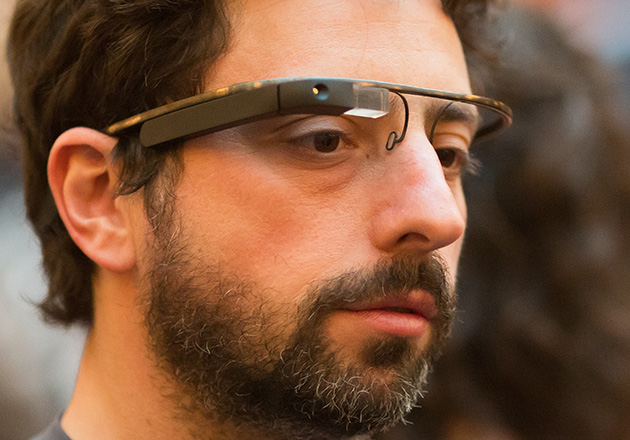Now that rats can telepathically tweet without even wielding a mouse, will the tortoise of human organisation win the race, or fall victim to Google glass?

Google Glass - the nerdy attachment to spectacles that will function as camera, phone and computer all in one - is about to launch the pansocial panopticon. We'll all be filming our entire lives and its periphery while Google, with oodles more data to crunch on, serves us ever more irresistible ads (and offers to government, under judicial orders, the data that they legislate for themselves). . That's the eye-popping scenario painted by Mark Hurst. Great piece. Dystopian.
Researchers have put electrodes into rat brains in Massachusetts and in Brazil. They then plugged the electrodes into the web in such a way that the signals coming from the Massachusetts rats were transmitted to the Brazilian rats. The northern rats were set a simple task - discovering that the blue lever on the left gave them food while the red lever on the right didn't. The Brazilian rats were set the same problem, without the color coding. When the southern rats could "listen" to what the northern rats were "intimating" through the web, they did much better at their harder task than when they couldn't. So we have rat-to-rat telepathy over the web.
Who knows how complex the problems are that networks of rats could end up solving. Of course, there's in a way not that much new here. We can think of our speech organs as being electrodes into the brain that have a way of transmitting, through anothers' auditory system, signals to electrodes implanted into another brain. And rats are social, so they communicate. So they reach into each others' brains already. But they weren't doing it over the web before. Rats can now telepathically tweet without even wielding a mouse. At least potentially - eliding the small matter of rats' dependency on hardware - this is imaginably empowering for the lab rat. Thoughts of better conditions could start spreading round the rat web. The age of the wisdom of networked rats is upon us.
I'd rather be like the rats who've found new ways to collaborate than the Google Glass wearer, feeding the data-hungry cloud.
I spent the morning - and last Sunday morning - working on the email lists of various local groups. Susie - a neighbour - and I knocked on doors to fill out the ranks of the the Brickfields Area Residents. We talked to neighbours we'd never seen and added them to the email group network that knits us together. I de-duplicated the mail list of the Friends of Wormwood Scrubs and changed it into a flat mail list - where everyone can talk to everyone else - from the old hierarchical "mail-shot" group that allowed some centralised authority - "the committee" - to send out announcements.
There are two webs being built.
The first is the one that has raced forward in the third decade of the network - the one that is fuelled by advertising money and that attracts the attention of powerful government. It is the one that will be given a great fillip by Google Glass if we're to believe Mark Hurst. We'll be feeding almost all reality as lived through Glass into the great data cruncher in the Google cloud. Expect to have to build real resistance to the ad campaigns that will know more and more about you, your weaknesses and your predilections. The battle will be very tough and many of us will become hopelessly engrossed by the goodies on offer. How many cases of the cyber-loafing wastrel, so wonderfully described by Lucy Kellaway, are already that - minds trapped by the web that advertising built? There's so much money to be made in this Web that it really has raced ahead. This Web could master us before we master it.
The tortoise in the race - a strong starter in the early Internet - is the web as a tool to join lives and make them better. Knocking on doors and building local email lists is building that web. It is the tortoise because it's an effort. Remember the scene in Social Network when Zuckerberg's first foray into social media - a "hot or not" rating site - goes viral. What the scene communicates is the power fantasy of virality: a night of coding, an app let loose on the network, and then you sit back and watch the throng. It's Faustian power. Compared to a morning of knocking on doors it is. Twenty emails later. Slow progress.
But it's building a different web. The viral web by its very nature trades in ephemeral connections. Gangnam style has brought me together in just one, fleeting way with the 1.5 billion people who've viewed it. The same is true with the clicktivist networks. It's probably even the case with Beppe Grillo's movement - we'll find out in the coming days if it has the strong connections needed to take power.
Susie, who's lived in the neighbourhood for ages, has been compiling its history. How it was nearly knocked down by motorways and rail-track widenings. How it was always considered dispensable by the powers beyond it. That's how we ended up hemmed in between motorways and rail lines. How its green spaces have been threatened. The slow web that we're building, slow connection by slow connection, will completely transform the politics of locality. And once that's done, who knows where the tortoise'll head.
